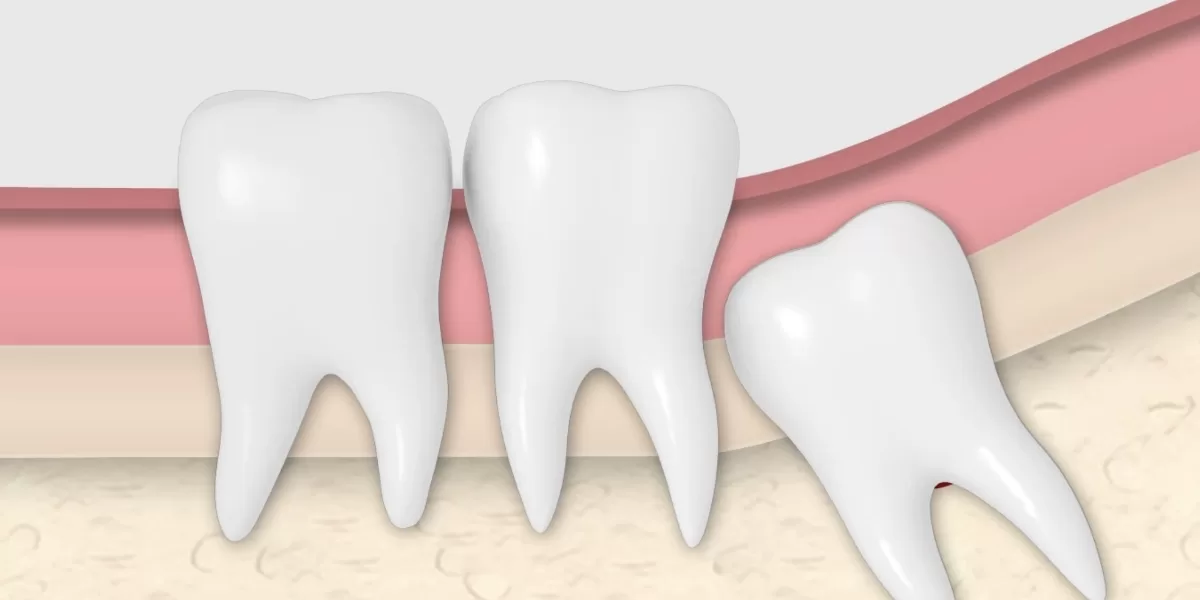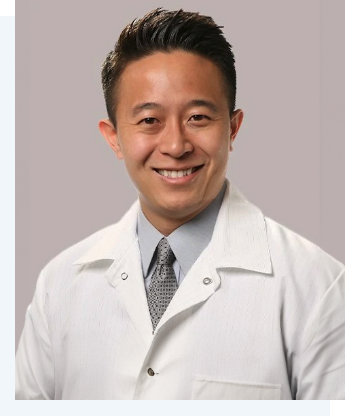
Chances are good that someone you know has had their wisdom teeth removed—maybe even recently. In most people, wisdom teeth emerge between the ages of 17 and 21 and are often removed shortly thereafter. It’s such a common procedure that many have come to believe it is simply a part of life, but why exactly? Patients seeking wisdom teeth removal in Pasadena do so for a variety of reasons, but let’s start by understanding why wisdom teeth so often become a problem.
Meet Dr. Christopher Chan
Dr. Chan is a dual-degree, board-certified Oral and Maxillofacial Surgeon with advanced training in dental implants, full arch restoration, and bone grafting.
Since 1953, Foothill Center for Dental Implants and Oral Surgery has delivered trusted results. Dr. Chan continues this legacy, offering local and truly personalized care.
Why Do Wisdom Teeth Cause Problems?
Though most people develop 32 permanent teeth in their lifetime, very few have mouths that can actually accommodate all of them safely and comfortably. The wisdom teeth are the last to grow in, erupting at the back of the mouth behind the second, or 12-year, molars. Often, by the time these final teeth come in, the mouth and jaw have grown in such a way as to not provide sufficient room for these large additional teeth.
When inadequate space prevents wisdom teeth from erupting into their proper position, they become impacted. Impacted teeth remain partially or entirely submerged in the gum tissue or bone beyond the normal period of eruption, necessitating wisdom teeth removal. Pasadena patients experiencing this common issue have come to trust Foothill Center for Dental Implants and Oral Surgery to safely remedy this issue and avoid further complications.
Most Common Reasons to Have Wisdom Teeth Removed
When you first consider it, tooth impaction may not seem like such a big deal. Your tooth remains stuck in your gums a little – so what? Unfortunately, the truth of the matter is much less trivial. Impaction of wisdom teeth can cause a whole host of problems, including:
Persistent pain
Infection
Crowding of teeth
Damage to neighboring teeth
Damage to the jawbone caused by the formation of cysts
Inflamed gums
The longer impaction is allowed to exist, the more problems you are likely to develop. Prolonged severe impaction can even alter the entire profile of your bite, causing further issues. Thankfully for patients in Pasadena, wisdom teeth removal by Dr. Chan at Foothill Center for Dental Implants and Oral Surgery can prevent these issues from occurring.
When Should I Have My Wisdom Teeth Removed?
As in many dental procedures, with wisdom teeth removal, time is of the essence. The longer wisdom teeth are allowed to remain in the mouth, the deeper their roots grow and the denser your jawbone becomes. With most people’s wisdom teeth erupting between 17-21 years of age, the older you are when you have them removed, the more difficult it is likely to be. Additionally, after the age of 30, the occurrence of problems common to impacted teeth tend to increase in frequency.
For these reasons, most people opt to have their wisdom teeth removed in their teens or early twenties, when their root structure has yet to fully develop. If you’re experiencing issues with your wisdom teeth or worry that you may in the future, schedule an appointment with Foothill Center for Dental Implants and Oral Surgery today.
What To Expect
Taking the First Steps
You may be used to seeing your general dentist for a check-up and cavities. While general dentists can also perform simple tooth extractions, wisdom teeth can be more complex. That’s why we often receive referrals for wisdom teeth removal. Pasadena dentists recognize that our advanced oral surgery training and our sedation techniques are often a better option for patients.
When you visit our office, we will take the time to answer your questions about the procedure; we want you to feel comfortable and confident in the process. As part of your appointment, Dr. Chan will examine your mouth and, potentially, take X-rays. This lets us see the position and state of the wisdom teeth. It also tells us whether you have four wisdom teeth, more, or fewer (it can vary person to person.) This examination lets us put together a treatment plan to suit your needs.
If you need wisdom teeth removal, Dr. Chan will discuss the risks, alternatives, and benefits of the procedure; and answer any questions.
Preparing for the Procedure
Before wisdom teeth extraction surgery, preparation helps ensure a comfortable recovery.
- Don’t eat or drink anything for 6 hours prior to the procedure. This includes water, coffee, and juice. If you take regular medications, you may continue to do so with a small sip of water.
- A responsible adult must safely drive you home after the procedure. Schedule several days for rest and minimal activity.
- Gather a one-week supply of nutritious soft foods such as protein shakes, soups, smoothies, pasta, rice, eggs, beans, and yogurt.
You can optimize your wisdom tooth removal experience by proactively addressing these details.
During the Procedure
Wisdom teeth removal utilizes anesthesia to provide the most comfortable experience. Depending on the complexity, local anesthesia numbs the area, and sedation induces a relaxed state. Dr. Chan accesses the wisdom tooth by making small gum incisions, and may remove bone if necessary. The tooth is carefully loosened and removed, possibly in sections. The socket is cleaned, and stitches may close the wound. Gauze helps control bleeding.
How Long Does the Procedure Take?
Wisdom teeth removal typically takes less than an hour to complete.
Does Getting Your Wisdom Teeth Taken Out Hurt?
Your comfort is one of our top priorities. Oral Surgeons are well trained in all aspects of anesthesia administration, such as local anesthesia, nitrous oxide, and all forms of sedation, including general anesthesia. We will provide anesthesia options to keep you fully comfortable throughout your wisdom teeth removal.
Immediately After the Procedure
After your surgery is complete and you wake up from your anesthesia, you will be closely monitored. Dr. Chan and his team will provide gauze stop bleeding, postoperative instructions, and electronically send prescriptions to your pharmacy. You will be discharged to head home for rest and healing.
Have a Ride Home
Due to the lingering effects of anesthesia, we require patients to have a responsible adult with them to safely drive them home. The adult must stay with you until you have sufficiently recovered to care for yourself. Rideshare services, taxis, and public transportation are acceptable if accompanied by a responsible adult.
How Long Are You Groggy After the Procedure?
Emerging from wisdom tooth removal, grogginess from anesthesia is common. Anesthesia affects different people in different ways, but most people feel back to normal within 24 hours or so.
Enhanced Recovery with Exparel
At Foothill Dental Implants, we prioritize patient comfort and strive to make your wisdom teeth removal experience as smooth as possible. That’s why we use Exparel®, a non-opioid medication that provides long-lasting pain relief after surgery.
Exparel and Your Wisdom Teeth Removal
Exparel will be administered during your wisdom teeth removal procedure to help manage your post-operative pain. This can help to reduce your reliance on opioids and allow for a more comfortable recovery. Learn more about Exparel.
Recovery and Aftercare
Wisdom teeth recovery is very well-tolerated. You’ll likely experience minimal bleeding and mild discomfort. Expect swelling to gradually increase over the next few days, which ice packs can help manage. Stick to soft foods and avoid strenuous activity to promote healing. Plan on taking a few days to rest and gradually transition back to your normal diet.
First 24 hours
You can anticipate some tenderness, swelling, and bleeding for the first day. These symptoms can be mediated with over-the-counter remedies like ibuprofen and Tylenol®. Liquids and soft foods are recommended to minimize irritation of the healing areas.
First Week
The first week of wisdom teeth recovery is all about managing discomfort and promoting healing. Here’s what to expect:
- Swelling and Discomfort: Swelling peaks around 2-3 days after the procedure, causing a “chipmunk cheek” effect. Pain medication helps manage discomfort, which gradually subsides throughout the week.
- Limited Diet: Soft, nutritious foods like yogurt, applesauce, and mashed potatoes are easiest to tolerate. Avoid chewing and stick to gentle rinsing with salt water or the prescribed mouth rinse.
- Rest and Relaxation: Strenuous activity can dislodge clots and delay healing. Plan for plenty of rest with your head elevated to minimize swelling.
- Gradual Improvement: By day 7, swelling and pain should significantly decrease. You may be able to introduce solid foods and resume light activity.
First Month
By the one-month mark after wisdom teeth removal, most patients experience a significant improvement and return to normalcy. Here’s what you can generally expect:
- Minimal Discomfort: Any lingering soreness should be mild and easily manageable. You likely won’t need pain medication anymore.
- Normal Diet: You should be able to comfortably eat most foods without restriction. However, be cautious with chewing very hard until complete healing.
- Restored Jaw Mobility: Jaw stiffness and limited opening should be gone, allowing for a full range of motion.
- Healing Completion: The extraction sites may still be slightly tender, but bone growth should be well underway. Stitches (if used) will have dissolved by now.
How Long Should I Expect to Be Out of Work or School?
While different patients recover at varied rates, most people are ready to resume normal day-to-day activities within two or three days.
How Long Should I Wait Before Eating?
You may begin drinking clear liquids such as water, juice, or soup immediately after the procedure. If you do not have nausea, then advance to a soft diet. After one week, you may gradually shift to a normal diet.
What Foods Can I Eat After Having My Wisdom Teeth Removed?
To aid in the healing process, it is important to consume adequate nutrition and calories. For one week, restrict your diet to plenty of soft nutritious foods such as protein shakes, soups, smoothies, pasta, rice, eggs, beans, and yogurt. Avoid hard foods that require chewing and spicy foods that will irritate the surgical sites. Try not to miss any meals because you will recover faster and experience less discomfort if you continue to eat. Do not use a straw because it can dislodge the blood clot and cause bleeding.
Wisdom Teeth Removal FAQs
Get Wisdom Teeth Removal in Pasadena, CA
Looking for safe and efficient wisdom teeth removal in Pasadena? Dr. Chan and the team at Foothill Center for Dental Implants and Oral Surgery are here to help. Call us at (626) 792-3161 today for an appointment!


